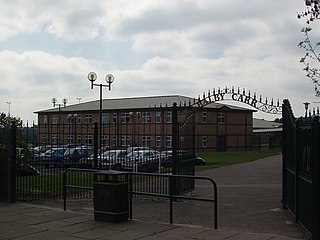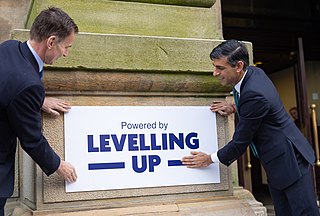
In England, a City Technology College (CTC) is an urban all-ability specialist school for students aged 11 to 18 specialising in science, technology and mathematics. They charge no fees and are independent of local authority control, being overseen directly by the Department for Education. One fifth of the capital costs are met by private business sponsors, who also own or lease the buildings. The rest of the capital costs, and all running costs, are met by the Department.
Education in Scotland is provided in state schools, private schools and by individuals through homeschooling. Mandatory education in Scotland begins for children in Primary 1 (P1) at primary school and ends in Fourth Year (S4) at secondary school. Overall accountability and control of state–education in Scotland rests with the Scottish Government, and is overseen by its executive agency, Education Scotland, with additional responsibility for nursery schools being the joint responsibility of both Education Scotland and the Care Inspectorate. Scotland's private schools are overseen by the Scottish Council of Independent Schools. Children in Scotland sit mandatory National Standardised Assessments in Primary 1 (P1), Primary 4 (P4), Primary 7 (P7) at the end of primary school, and Third Year (S3) in secondary school, which assist in monitoring children's progress and providing diagnostic data information to support teachers' professional judgement.

A comprehensive school is a secondary school for pupils aged 11–16 or 11–18, that does not select its intake on the basis of academic achievement or aptitude, in contrast to a selective school system where admission is restricted on the basis of selection criteria, usually academic performance. The term is commonly used in relation to England and Wales, where comprehensive schools were introduced as state schools on an experimental basis in the 1940s and became more widespread from 1965.

The specialist schools programme (SSP), first launched as the Technology Colleges programme and also known as the specialist schools initiative, specialist schools policy and specialist schools scheme, was a government programme in the United Kingdom which encouraged state schools in England and Northern Ireland to raise private sponsorship in order to become specialist schools – schools that specialise in certain areas of the curriculum – to boost achievement, cooperation and diversity in the school system. First introduced in 1993 to England as a policy of John Major's Conservative government, it was relaunched in 1997 as a flagship policy of the New Labour governments, expanding significantly under Prime Minister Tony Blair and his successor Gordon Brown. The programme was introduced to Northern Ireland in 2006, lasting until April 2011 in England and August 2011 in Northern Ireland. By this time, it had established a near-universal specialist system of secondary education in England, with almost every state-funded secondary school in England having specialised. This system replaced the comprehensive system which had been in place since the 1970s.

An academy school in England is a state-funded school which is directly funded by the Department for Education and independent of local authority control. The terms of the arrangements are set out in individual Academy Funding Agreements. 80% of secondary schools, 40% of primary schools and 44% of special schools are academies.

Astrea Academy Woodfields is a secondary school and sixth form located in the Balby area of Doncaster in the English county of South Yorkshire. The school operates under Astrea Academy Trust.

Building Schools for the Future (BSF) was the name given to the British government's investment programme in secondary school buildings in England in the 2000s. Around half of the work was procured under the private finance initiative. The delivery of the programme was overseen by Partnerships for Schools (PfS), a non-departmental public body formed through a joint venture between the Department for Children, Schools and Families (DCSF), Partnerships UK and private sector partners. The programme was cancelled in 2010.

An Arts College, in the United Kingdom, is a type of specialist school that specialises in the subject fields of the performing, visual, digital and/or media arts. They were announced in 1996 and introduced alongside Sports Colleges to England in 1997, being one of the five "practical specialisms" of the specialist schools programme. They were then introduced to Scotland in 2005 and Northern Ireland in 2006. By 2011, when the programme ended, there were over 491 Arts Colleges in England. More have been introduced since then, however schools must be an academy, free school or use the Dedicated Schools Grant to become one.

The Schools of Ambition programme, also called the Schools of Ambition initiative, was a government programme in Scotland that aimed to improve school character and performance by offering struggling secondary schools philanthropist money and an extra annual £100,000 in government funding for three years. This would then be spent towards implementing a transformation plan that could include environmental changes, investment into curricula and staff, and cooperation with businesses, sixth forms and the local community. Participating schools became Schools of Ambition, specialist schools that likely had a change in management, which aimed to stand out as innovating, leading schools that would inspire the youth. The scheme was launched by Jack McConnell's Labour–Liberal Democrat coalition government in 2005 and discontinued by Alex Salmond's SNP government in 2010.
A voluntary aided school is a state-funded school in England and Wales in which a foundation or trust contributes to building costs and has a substantial influence in the running of the school. In most cases the foundation or trust owns the buildings.

A university technical college (UTC) is a type of secondary school in England that is sponsored by a university and has close ties to local business and industry.

Specialist schools in the United Kingdom are schools with an emphasis or focus in a specific specialised subject area, which is called a specialism, or alternatively in the case of some special schools in England, in a specific area of special educational need. They intend to act as centres of excellence in their specialism and, in some circumstances, may select pupils for their aptitude in it. Though they focus on their specialism, specialist schools still teach the full curriculum. Therefore, as opposed to being a significant move away from it, the specialism is viewed as enriching the original curricular offer of the school.

English state-funded schools, commonly known as state schools, provide education to pupils between the ages of 3 and 18 without charge. Approximately 93% of English schoolchildren attend such 24,000 schools. Since 2008 about 75% have attained "academy status", which essentially gives them a higher budget per pupil from the Department for Education.

A comprehensive school, or simply a comprehensive, typically describes a secondary school for pupils aged approximately 11–16 or 11–18, that does not select its intake on the basis of academic achievement or aptitude, in contrast to a selective school system where admission is restricted on the basis of selection criteria, usually academic performance. In England and Wales comprehensive schools were introduced as state schools on an experimental basis in the 1940s and became more widespread from 1965. They may be part of a local education authority or be a self governing academy or part of a multi-academy trust.
A National Challenge School was a school in the United Kingdom that had failed to conform with standards imposed by OFSTED, and rather than being closed and the pupils displaced, was taken over by the Department for Children, Schools and Families (DCSF) who set an improvement agenda.
Multi-Academy Trust (MAT) or academy chain is an academy trust that operates more than one academy school. Academy schools are state-funded schools in England which are directly funded by the Department for Education and independent of local authority control. The terms of the arrangements are set out in individual Academy Funding Agreements. The group of schools in a multi-academy trust work together under a shared academy funding agreement.

"Levelling up" is a political policy first articulated in the 2019 Conservative Party manifesto that aims to reduce the imbalances, primarily economic, between areas and social groups across the United Kingdom. It seeks to do so without acting to the detriment of prosperous areas, such as much of South East England. A white paper for the policy was published by Boris Johnson's government on 2 February 2022, and has been continued by Rishi Sunak's government. The policy is overseen by the Department for Levelling Up, Housing and Communities, and the incumbent Secretary of State is Michael Gove.

A maths school is a type of specialist free school sixth form college in England which specialises in the study of mathematics. Each maths school is sponsored by a university and, frequently, also a nearby established sixth form college or multi-academy trust. All students in a maths school must follow a course of study that includes A-Levels in mathematics and further mathematics.
The federal government of the United States has limited authority to act on education, and education policy serves to support the education systems of state and local governments through funding and regulation of elementary, secondary, and post-secondary education. The Department of Education serves as the primary government organization responsible for enacting federal education policy in the United States.

A school federation is a group of schools in England and Wales which, as defined in the Education Act 2002, operate under a statutory shared governing body, or whose governing bodies form a shared committee with collaborative terms of governance. Soft federations with a statutory committee can be called soft governance federations. Schools in a federation are known as federated schools.

















